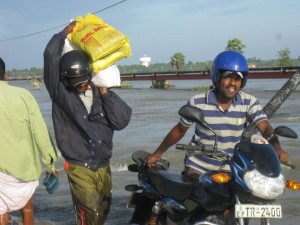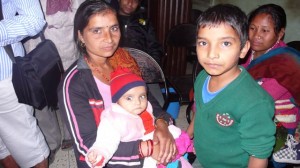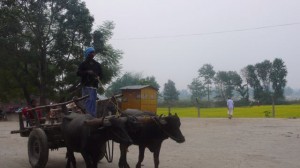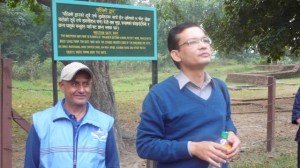Rose Charities Sri Lankas workers use motorcycles to take food out to children and families stranded by the floods . See http://rosesrilanka.info
Dr David Sabiston teaches at Rose Cambodia Sight Center
Dr David Sabiston (NZ Order of Merit) is one of the stars in the history of the Rose Charities Sight Center. Over the past 7 years David has generously donated his teaching experience, his extensive international experience and personal resources to bringing the Sight Center to one of the foremost blindness prevention and sight restoration establishments in Cambodia. He has elicited donations in materials and funds. The center has treated some 90,000 patients since 2002 and much of this incredible number was able to be achieved through Davids work.
A message from Trish Gribben, chair, Rose Charities NZ
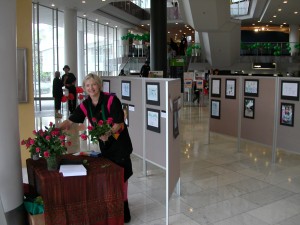 Greetings for New Year 2011 Everyone!
Greetings for New Year 2011 Everyone!
It is going to be a most exciting year with great projects on the Rose NZ calendar.
I have hardly come back to earth since paragliding in late November with the heavenly Himalayas stretching their pure white peaks against the blue blue sky. To be more exact, my flight took off from Senekot, a village above Pokhara, and it was the Annapurna range with the sacred mountain, Machupachare, backgrounding my view……and what made me feel even more airborne that day was quite astonishing news I had just received about Rose NZ’s latest project.
The backstory goes like this: In 2008 Rose NZ brought ophthalmologist Dr Basant Sharma, a director of the Lumbini Eye Institute, to New Zealand for three weeks professional development. He stayed with us in our home and charmed everyone who met him.
Naturally, when I went to Nepal recently in a group of 15 people with Footprints, I asked if a visit to Lumbini could be on the itinerary to visit Basant. John McKinnon who, with his wife Diane, leads Footprints tours, is a retired ophthalmologist so he too was keen to visit the Institute. (The McKinnons were the first doctor and teacher in Sir Ed Hillary’s first Sherpa hospital in the Kumbu and this year celebrate the 50th anniversary of that pivotal time in their lives.)
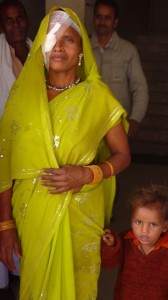 Lumbini is in the southern Terai, or the plains area of Nepal near the border with India, and it is also a World Heritage site as the birthplace of Buddha. There was a double reason for going there.
Lumbini is in the southern Terai, or the plains area of Nepal near the border with India, and it is also a World Heritage site as the birthplace of Buddha. There was a double reason for going there.
Our time at the Lumbini Eye Institute(LEI), hosted by Basant, made a big impact on us all as we took in the extraordinary “production line” of the outpatient clinics overflowing with people patiently waiting to be registered, assessed for surgery or glasses, then being treated. The flow embraces 800 patients a day, with a dozen ophthalmologists doing 200 cataract operations every day, in three operating theatres, each with four operating tables. In the area where glasses are dispensed, people were thronging as deeply as those on an Indian railway station about to catch a train. Not surprising when you learn that the catchment population for the LEI is 20 million poor people, many of them coming from India. The Nepali government contributes not a rupee to the work.
Still reeling from the intensity of visiting the LEI, we set off on the dusty pot-holed road to Kapilavastu where, about an hour’s bus ride away, a rural outpost eye clinic operates from an unfinished two-storey building, able to give only rudimentary diagnosis and treatment of basic eye problems.
The road to Kapilavastu winds back more than 2500 years. It was there that Prince Siddhartha lived a royal existence in palaces that are currently being revealed by archeologists. It was from Kapilavastu that he set off, aged 29, in search of the meaning of life, suffering and enlightenment. But it was not the Buddha’s story that captivated us most that day.
We were welcomed at the local eye clinic with kata, the white scarves of greetings, and leis of marigolds by the village District Health Committee, and were shown around the unfinished building. We were told how funding sources had dried up and of plans that money could make come true. We heard how the clinic, which would draw on a similar catchment of 20 million poor people, could offer cataract surgery, how the LEI as the parent body could send more eye surgeons if equipment was permanently there, how the distressing rate of eye problems in young and old could be reduced. We heard how the clinic could become self-sustaining within a short time of its establishment.
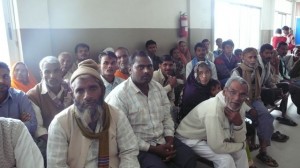 The amounts needed for the project are estimated at $US10,000 for the completion of the building and $US20,000 for the equipment needed, including a generator to cope with the major power outages that are standard — about 18 hours a day WITHOUT power.
The amounts needed for the project are estimated at $US10,000 for the completion of the building and $US20,000 for the equipment needed, including a generator to cope with the major power outages that are standard — about 18 hours a day WITHOUT power.
As Basant translated, we all listened carefully and asked questions. As chairperson of Rose NZ I spoke briefly, saying I would take their story in my heart and mind back to our trustees in NZ, but it was impossible for me to give any promises on the spot. I left with the faces of the district committee, so trusting and hopeful, carved on my mind. Every member of our group was moved and impressed.
Now, Fast Forward to nearly a week later when we were walking on a ridge at Senekot where the morning sun was burning off the mists over Pokhara. My friend Basant tells me that a glimpse of the Himalayas is enough to purify the soul; that day, with the full glory of the mighty Annapurna peaks rising before us, our souls must have been squeaky clean.
 As I walked along the mountain tracks, starting to contemplate paragliding, my fellow travellers fell quietly into step beside me. By the time I took to the skies the clinic at Kapilavastu had been promised $NZ10,000 by my generous companions.
As I walked along the mountain tracks, starting to contemplate paragliding, my fellow travellers fell quietly into step beside me. By the time I took to the skies the clinic at Kapilavastu had been promised $NZ10,000 by my generous companions.
The Rose NZ Nepal project for 2011 was taking off! Is it any wonder I was nearly over the moon?
Within a week of my homecoming, Rose NZ trustees formally and unanimously approved the Nepal rural eye clinic project. We will help make it happen, alongside our on-going commitment to the Rose Eye Clinic In Phnom Penh, Cambodia. There are exciting developments in Cambodia too —- but that’s another story: See News from Phnom Penh (pip/will: can it be a link to click on?)
Watch this space for fundraising news as 2011 ticks along.
TO DONATE:
Anyone wishing to donate to the Kapilavastu Rural Eye Clinic should send a cheque made out to Rose Charities New Zealand
c/- Rose Treasurer Jane Midgley
Midgleys and Partners
P.O. Box 3714
Christchurch, 8015

